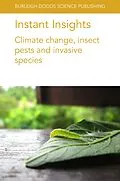This specially curated collection features three reviews of current and key research on climate change, insect pests and invasive species.
The first chapter reviews the impact of climate change on insect pests and how it has affected insect pest development and population dynamics, activity and abundance, diversity and geographical distribution. It also assesses insect-host plant interactions and the effectiveness of crop pest management techniques.
The second chapter discusses the literature on the potential impact of climate change on the principal insect pests of wheat, including cereal aphids, Hessian fly, orange wheat blossom midge, cereal leaf beetle and cotton bollworm. It assesses the different methods used to assess likely impacts as well climate change effects on biological control in wheat systems.
The final chapter surveys what we know about the ecology of invasive species and potential management strategies. In particular, it assesses how integrated pest management (IPM) needs to evolve to deal with invasive species, particularly in focussing more on monitoring, prevention and rapid response.
Autorentext
Contributions by: Kayode David Ileke, Federal University of Technology - Akure, Nigeria; and Luke Chinaru Nwosu and Maduamaka Cyriacus Abajue, University of Port Harcourt, Nigeria; Sanford D. Eigenbrode, University of Idaho, USA and Sarina Macfadyen, CSIRO, Australia; Robert Venette, USDA Forest Service, USA; and Amy Morey, University of Minnesota, USA
Inhalt
Chapter 1 - Understanding and mitigating the impact of climate change on insect pests and food security: Kayode David Ileke, Federal University of Technology - Akure, Nigeria; Luke Chinaru Nwosu and Maduamaka Cyriacus Abajue, University of Port Harcourt, Nigeria;
Chapter 2 - The impact of climate change on wheat insect pests: current knowledge and future trends: Sanford D. Eigenbrode, University of Idaho, USA; and Sarina Macfadyen, CSIRO, Australia;
Chapter 3 - Advances in understanding the ecology of invasive crop insect pests and their impact on IPM: Robert Venette, USDA Forest Service, USA; and Amy Morey, University of Minnesota, USA;
